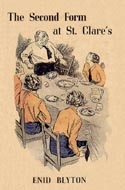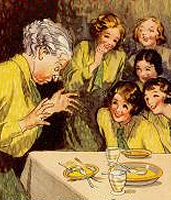
The Second Form at St Clare's
Review by Shagufta Naaz (February 2, 2006)
After spending three books in the same form, the girls have finally moved up—hallelujah! My take on this somewhat skewed format is that Blyton probably planned to write a book set in each term but found it too constricting (how many different characters can you introduce per term anyway?) and went through the remaining forms rapidly, skipping the third entirely.
So, as usual we see the twins getting ready for school, trying to stuff all they can in their bags and generally feeling thrilled at going back—altogether very different from the stuck-up twins we saw earlier. Their mother accompanies them to the station, but we don't even see her wish the girls goodbye, they are too busy meeting up with Janet, Bobby and the rest of the crowd. All too soon they reach the school and the new term begins.
And what a term it is! To begin with, the girls are lumbered with two girls from the outgoing form, lazy Anna and spiteful Elsie. To make things worse, both of them are made joint head girls, which doesn't bode too well. If that isn't enough, Mirabel Unwin makes a fiery entry the very next day. Like Margery Fenworthy in The O'Sullivan Twins, she's set on making everyone's life miserable. (Hmm, there must be something about the letter 'M' that brings out the worst in Blyton's girls).
Says Pat, "The second form is going to be quite an exciting place this term." And I would agree. The Second Form at St. Clare's is definitely my favourite of the series. The plot is a lot more cohesive than the somewhat episodic nature of the earlier books, with the main story revolving around Mirabel and Gladys. Blyton does a wonderful job of showing how friendship between two very different people can bring out the best in both, and there are plenty of heart-warming moments as we see the two girls help each other settle down.
And what about the two unwanted head girls? While lazy Anna pulls up her socks and proves herself a worthwhile head, Elsie continues to abuse her position and sets everyone's back up, leading to some drastic action by the form. I liked how Blyton shows that at times one has to take a stand and challenge wrong decisions, even if they are made by someone in authority.
Along the way we get to read about one of the best midnight feasts in the entire series, where the girls outwit the enemy and manage to have a grand time. We also get a concert and the obligatory trick on Mamzelle. (Mamzelle would need to be a near-moron to be taken in by this one, in my opinion).
All in all a nice, feel-good read.


